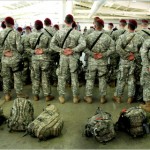Pentagon's DADT Study: A Win for Gay Rights
 Like the California Prop 8 ruling, the Pentagon's “Don't Ask, Don't Tell” study is a blow to the barriers holding gays from engaging in the same activities as others.
Like the California Prop 8 ruling, the Pentagon's “Don't Ask, Don't Tell” study is a blow to the barriers holding gays from engaging in the same activities as others.
One striking aspect of the Pentagon's recently released study on repealing “Don't Ask, Don't Tell” (DADT) are the similarities it has to Judge Walker's ruling which struck down Proposition 8 in California. While the documents deal with different topics they both make the same fundamental point: the barriers that prevent homosexuals from partaking in the same activities heterosexuals do are ultimately artificial and without rational basis.
These two documents help to advance an important truth: that homosexuality is not an aberration or a deviation, and that a person's sexual orientation does not hinder or damage a person's competence, or ability to perform as well at a task as a heterosexual.
In his ruling on Proposition 8, Judge Walker wrote:
Proposition 8 fails to advance any rational basis in singling out gay men and lesbians for denial of a marriage license. Indeed, the evidence shows Proposition 8 does nothing more than enshrine in the California Constitution the notion that opposite sex couples are superior to same-sex couples.
Proponents of Proposition 8 have stated in their appeal that they wish to argue that opposite sex couples are superior to same-sex couples since they can procreate. That would likely be a definition of marriage that not even all heterosexual couples currently live up to. On the basic ability to love and support each other in a relationship, same sex couples are just as capable as opposite sex couples.
The DADT study does something similar. It first points out that as a practical manner, gays are already successfully integrated into the military anyway:
The reality is that there are gay men and lesbians already serving in today’s U.S. military, and most Service members recognize this. As stated before, 69% of the force recognizes that they have at some point served in a unit with a co-worker they believed to be gay or lesbian. Of those who have actually had this experience in their career, 92% stated that the unit’s 'ability to work together' was 'very good,' 'good,' or 'neither good nor poor,' while only 8% stated it was 'poor' or 'very poor.'
However, since the key difference is that now their service would be open, the question is whether this change would create new disturbances that hurt the military's ability to operate. The report states that in fact, those who serve openly have the same incentive to not create incidents and to be responsible members of their organization:
If gay and lesbian Service members in today’s U.S. military were permitted to make reference to their sexual orientation, while subject to the same standards of conduct as all other Service members, we assess that most would continue to be private and discreet about their personal lives. This discretion would occur for reasons having nothing to do with law, but everything to do with a desire to fit in, co-exist, and succeed in the military environment.
This line of logic makes sense. There is no reason why an openly gay service member should want to let their sexuality be an issue in their job performance. What incentive do they have to be a source of discord?
The two documents help to build on a growing picture of acceptance of homosexuality as a normal way of life that is outpacing even some liberal and Democratic positions. It used to be that "civil unions" were seen as a decent liberal compromise on the issue of gay marriage. Now, even civil unions get mocked for being a half-hearted attempt to skirt the issue of gay marriage:
At this point the only surprise is that liberals are not using the phrase "separate but equal" as a way to object to civil unions.
The trend line is clear. Institutions are now able to state that the barriers which have held back homosexuals from engaging in the same activities as heterosexuals are largely artificial, and likely to crumble as society recognizes that sexual orientation is neither a sin nor a mark of deviancy, but instead a fully acceptable way of life that does not need to be stigmatized or given special treatment.
Follow Noah on Twitter: @noahkgreen